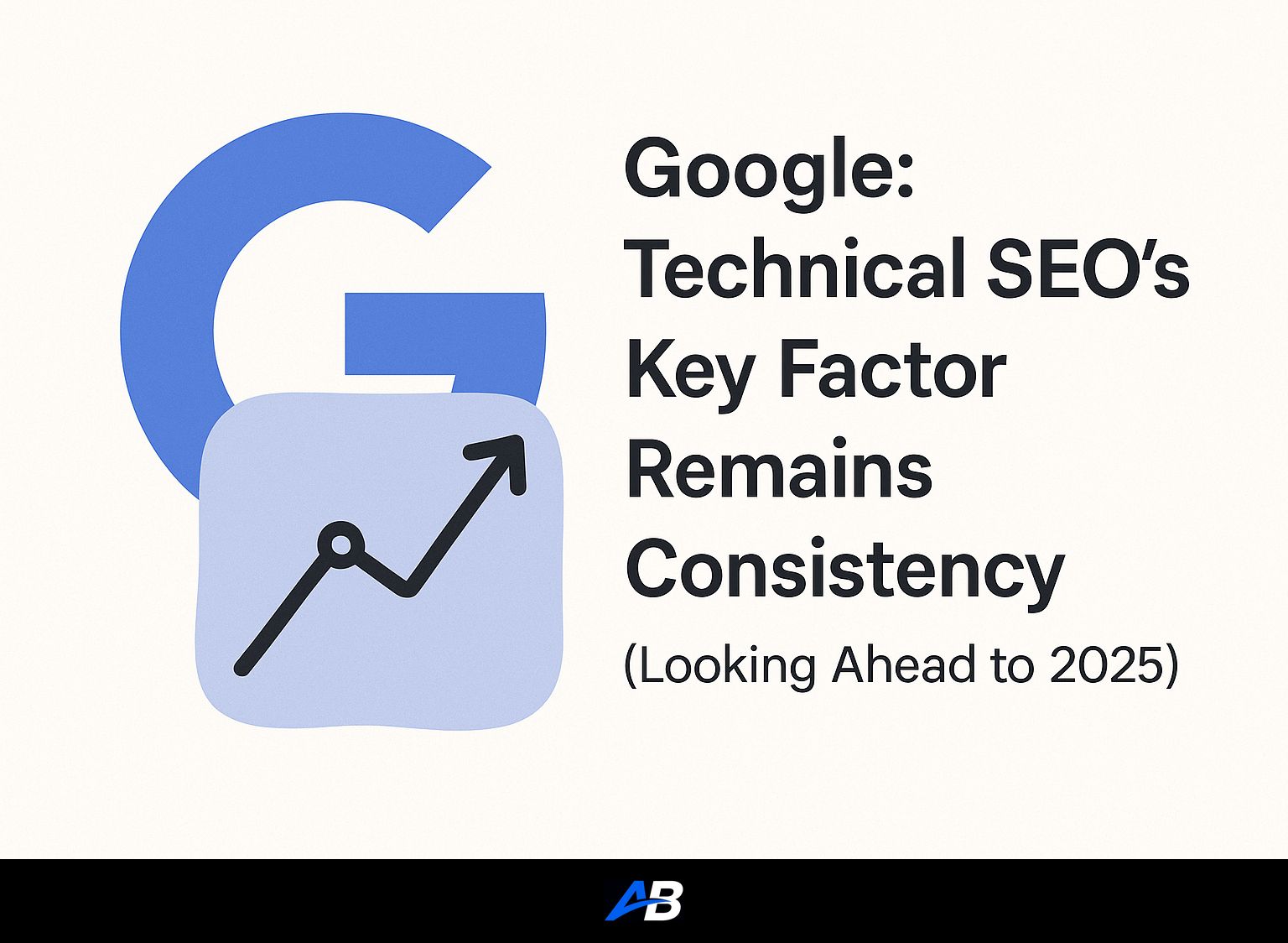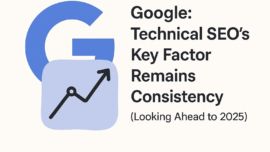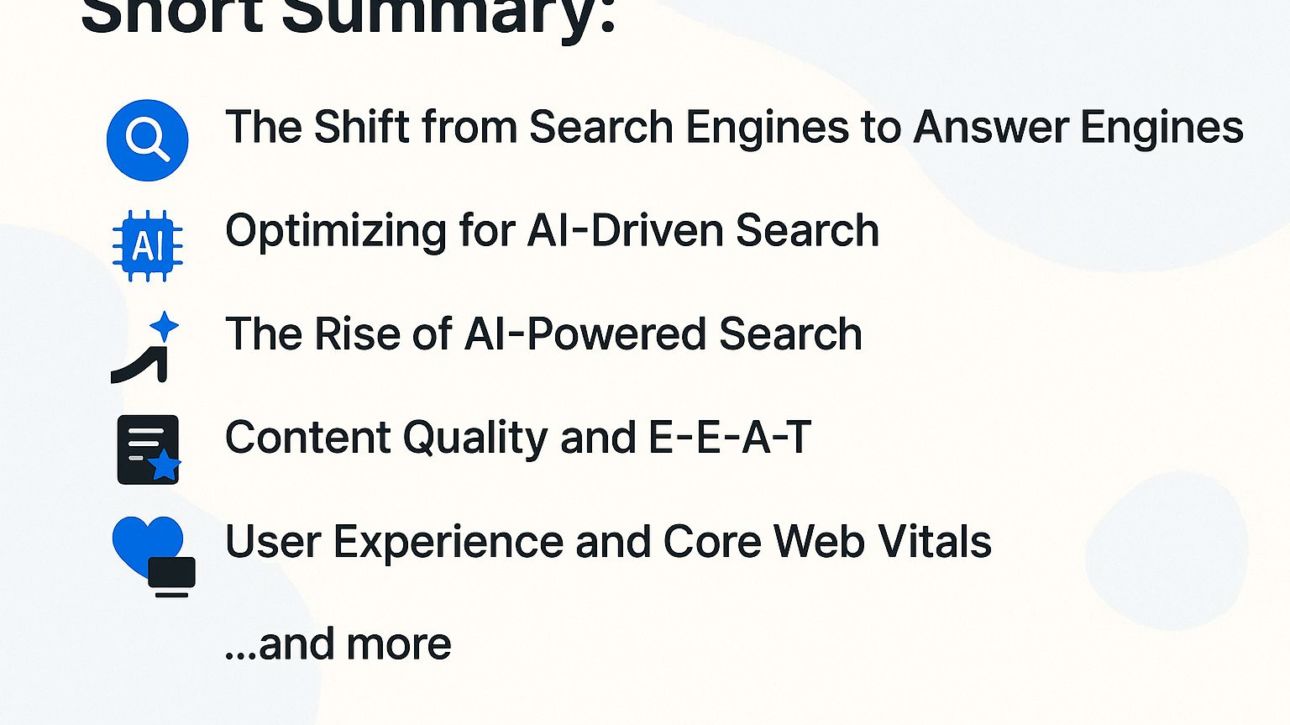In the rapidly evolving world of digital marketing, maintaining consistency in SEO strategies remains pivotal as we approach 2025. John Mueller from Google reiterates the importance of this principle, emphasizing its significance as a cornerstone of technical SEO.
Contents
Short Summary:
- Google’s John Mueller emphasizes consistency as the key factor in technical SEO.
- AI technologies are reshaping user behavior and SEO strategies.
- High-quality, authoritative content is becoming more critical amid these changes.
The digital landscape is undergoing profound changes, especially in the realm of SEO. As we look ahead to 2025, it’s evident from the insights shared by John Mueller, a prominent figure in Google’s Search Relations team, that consistency is the bedrock of successful technical SEO. Time and again, Mueller has stressed that delivering consistent signals across a website is paramount, stating on Bluesky, “Consistency is the biggest technical SEO factor.”
“When you build your site, make sure the links to the same pages are the same, canonicals match what you’re doing on your navigation, the content across the board feels consistent, and the structured data matches what is on the page,” Mueller explained.
This straightforward yet powerful advice is crucial for digital marketers and webmasters aiming to enhance their SEO strategies. As the industry continues to embrace the integration of AI technologies, understanding these shifts becomes imperative. Notably, Gartner predicts that by 2026, traditional search engine volume will drop by 25%, pushing marketers to adapt their strategies to align with emerging trends.
The Shift from Search Engines to Answer Engines
Recent advancements, particularly in AI tools like Google’s Gemini and Bing’s integration of ChatGPT, denote a transition from search engines to “answer engines.” This evolution means that users are increasingly engaging in conversational and visual searches, querying the web in ways that prioritize direct answers instead of a list of links.
Mueller indicates that adapting to these changes is essential for businesses. As user behavior shifts towards longer, question-based queries, websites must pivot their focus on optimizing for AI-driven search.
Optimizing for AI-Driven Search
The implications of AI integrations in search engines are multifaceted. Websites are now challenged to cater to a more nuanced understanding of semantic relevance. This is where natural language processing (NLP) technologies come into play, enabling search engines to discern user intent and deliver hyper-personalized results.
Some actionable steps for optimizing your content for AI-driven search include:
- Implement long-tail, conversational keywords that reflect common user queries.
- Develop topic clusters that cover subjects comprehensively.
- Create in-depth, valuable content that addresses user queries holistically.
For an elaborate guide on these practices, refer to Autoblogging’s Knowledge Base.
The Rise of AI-Powered Search
As AI tools gain traction, traditional organic web traffic is expected to decline, affecting overall visibility. According to Search Engine Land, the AI Overview now appears for approximately 15% of searches, with around 60% of long-tail queries triggering these AI features.
“The landscape is changing quickly. More searches now return a direct response, which means less reliance on organic links,” noted SEO experts.
Given this context, businesses are urged to rethink their approach to SEO, emphasizing the importance of creating content that satisfies both user intent and algorithm expectations. The future demands a keen understanding of search trends and adaptability in content strategies, all while ensuring high-quality output.
Content Quality and E-E-A-T
As AI evolves, the importance of content quality becomes even more pronounced. Google has increasingly favored content that fulfills the E-E-A-T criteria: Experience, Expertise, Authoritativeness, and Trustworthiness. In this light, low-quality, AI-generated content is poised to be sidelined, further underscoring the need for authenticity and credibility in digital writing.
To enhance E-E-A-T, follows these guidelines:
- Incorporate comprehensive author bios to showcase expertise.
- Provide citations and reliable references to substantiate claims.
- Utilize AI tools judiciously, ensuring human oversight to maintain content quality.
For businesses keen on boosting their content strategy with AI tools, the AI Article Writer from Autoblogging.ai ensures that articles produced meet the rigorous standards set forth by search engines.
User Experience and Core Web Vitals
Beyond content quality, user experience plays a critical role in SEO rankings. Core Web Vitals, which measure aspects like page load speed and usability, are factors that search engines increasingly reward. As we progress towards 2025, optimizing for these metrics is no longer optional but mandatory.
Implementing best practices to enhance Core Web Vitals include:
- Compressing images to improve loading times.
- Ensuring mobile responsiveness for a seamless user experience.
- Minimizing layout shifts to improve visual stability.
The Role of Backlinks
High-quality backlinks remain a fundamental aspect of successful SEO strategies. The emphasis on links from authoritative sites like Reddit, Quora, and other high-trust domains has only intensified as AI-powered search engines prioritize these signals. To bolster your backlink strategy:
- Create original, data-driven content that naturally attracts links.
- Engage in guest blogging on reputable sites within your niche.
- Collaborate with industry influencers to expand outreach.
Adapting to Change
The SEO landscape will continue to evolve, and staying ahead requires a proactive approach. Businesses must embrace the shifting paradigms characterized by AI’s integration into search, ensuring they remain visible and relevant in an increasingly competitive marketplace.
In conclusion, consistency is, and will remain, a vital factor in the realm of technical SEO. By focusing on delivering consistent, valuable, and user-centric content, leveraging AI technologies thoughtfully, and adapting to changing user behaviors, brands can establish a solid foundation for success in 2025 and beyond. Remember, the future of SEO doesn’t merely depend on keeping track of Google’s ranking factors; it relies heavily on understanding and implementing a holistic, user-focused strategy.
For more updates on SEO practices and how to optimize your digital presence, stay tuned to the Latest SEO News section. Together, we can navigate the intricacies of the digital landscape!
Do you need SEO Optimized AI Articles?
Autoblogging.ai is built by SEOs, for SEOs!
Get 30 article credits!



